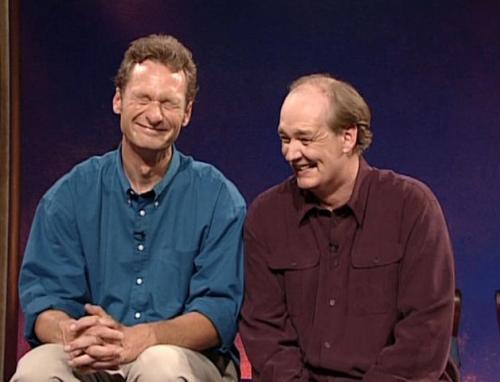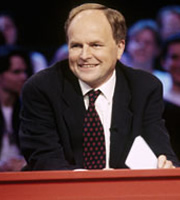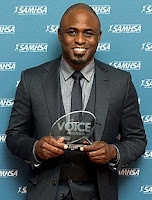 It isn't unusual for television and movie buffs to hear the following remarks:
It isn't unusual for television and movie buffs to hear the following remarks:The book version is better.I'll refute the first two at a later time, but I want to deal with the last right now. It isn't atypical for us Americans to feel rather ashamed of our supposedly crass culture, to assume that other countries only produce worthwhile and artistically sensitive programming.
Regular programming is so trite.
The British version is better . . .
This is completely silly--there's as much good and bad programming in Japan and France and Great Britain as anywhere else. In fact, in general, American programming produces more decent shows simply due to volume (we produce more crappy shows too; we just produce more shows in general).
 I'm a fan of many BBC shows from The Vicar of Dibley to Doctor Who to Poirot. And I wish BBC quiz shows were more easily obtainable.
I'm a fan of many BBC shows from The Vicar of Dibley to Doctor Who to Poirot. And I wish BBC quiz shows were more easily obtainable.However, I recently tracked down the BBC Whose Line Is It Anyway? which preceded the American version (of the same title) by about a decade. And I have to say: although I'd been told that the BBC version was wittier, etc. (everything British is better!), I consider the American seasons I've seen of far higher quality than the initial BBC seasons.
1. The stand-up comics in the BBC version don't always follow the rules.
 |
| Astounding Ryan Stiles and adorable Colin Mochrie |
In the BBC version, on the other hand, the comics start doing whatever they want, even if it doesn't fit the "rules."
Granted, the rules in both shows don't mean much. But most satire arises from how deliberately rules are broken--which means using the rules in the first place.
In the first season of the American version, Ryan Stiles and Colin Mochrie (who both appear in the British version) perform a routine about vampires. At one point, Colin, who is being manipulated by an audience member, mutters to Ryan's chest, "I forgot my stake, so I'm going to have to chew through your chest."
The best example of how the British version doesn't do this is the British "game" in which the comics mimic authors' styles while telling different parts of a story. One of the British comics always, always, always mimics a pretentious writer. It's funny once but after awhile . . . And he never tries to line up his spoof with the assigned topic. He simply goes off on a tangent.
This is so common in the first season that at one point, the host--Clive Anderson--remarks rather testily that no one is getting any points because no one actually kept on-target.
2. The American version is more versatile.
Now at this point, I will acknowledge that the American version built off the British version. The American version started with the amazing Ryan Stiles and Colin Mochrie (Ryan joined the British version in its second season; Colin two seasons later). The American version started with many of the rough parts smoothed out.
 It also started with a leg up on physical comedy.
It also started with a leg up on physical comedy.Now, I'm not a huge fan of slapstick. However, this type of show requires pure physical comedy. Ryan Stiles, when he acts like a hunted deer, and Colin Mochrie, when he acts like a bad trapeze artist, or both of them ("It's a disaster! What should we do? Run from side to side!") are hilarious.
Stiles and Mochrie are also the kind of comics who think alike and are therefore able to produce very funny routines where one guy picks up where the other guy left off.
The first seasons of the British version don't have much if any physical comedy (I will allow that it may have changed later on). It is terribly talky--and I'm the kind of person who usually loves witty dialog! But still, for a show of this type, you need physical comedians.
3. The American version has Wayne Brady as a regular.
In addition, a show like Whose Line Is It Anyway? relies on irony and spoofs. That is, to make the joke, the comic has to fully comprehend what is being satirized. Wayne Brady is unbelievably gifted in this area from mimicking Ray Charles to Tim Curry (yup, Brady spoofed the Rocky Horror Picture Show) to . . . shoot, you name it. He's the kind of guy who would clean up all the pink pie pieces in Trivial Pursuit.
And don't forget Laura Hall!
 |
| The kindly Clive Anderson |
Again, this may be because the American version got the show after it had already been tested. But Greg Proops, who is a seriously funny comic worthy of Phil Hartman (rest in peace), seems far more ill-at-ease--and somewhat under-appreciated--in the British version than in the American version.
I don't think this is the host. Clive Anderson has a friendly Drew Carey quality (what is about game show hosts?). Rather, it seems to be the other comics. In the British version, they all seem focused on their own shtick, being funny in their own right. In the American version, they often play off each other.
So, while I will grant that the American show likely benefited from the British show going first and working out the kinks, I want to go on record: the British version of something is NOT automatically the best version.


4 comments:
I have the first 4 seasons of the BBC Whose Line on DVD. Once they got John Sessions off, it improved.
I'd say the BBC version is not as funny, but I wonder if that is because of a cultural gap, or because it just isn't that funny? Humor, more than other art forms, is more tightly bound to cultural norms, in part because of the basic rule: If I have to explain it, it's not funny. The show went 10 seasons in the UK, so it seems THEY thought it was funny.
I will also say that I much preferred Clive Anderson as host to Drew Carey. The last two seasons of the BBC version were produced in NY with the nascent American(and Canadian) cast but Anderson hosting.
I think there is something to the humor translation problem. Even when an audience and a comic come from the same place, humor often doesn't translate! A few years ago, some Hollywood studio put on a competitor to American Idol--the studio included dancing, singing, AND stand-up. Within a season, the stand-up comedy section was eliminated. The judges just couldn't agree!
On a slight tangent, I've found that when comics find they aren't reaching their audience, they almost always resort to sex-jokes. That is, they try to provoke (at least) uncomfortable laughter rather than *surprised* laughter. One cool thing about Ryan Stiles and Colin Mochrie and Wayne Brady is their ability (in general--there are lapses) to evoke surprised laughter through satire. But of course, that anticipates a reasonably well-educated audience, culturally speaking!
Sex jokes, and vulgarities, are the last refuge of the unfunny. The family channel kept these to a minimum on WLIIA, but I have the general impression that Carey and some of the female guests were the most frequent transgressors on this point.
Another big asset to the US version was Wayne Brady's voice. That man can SING. Josie Lawrence and Mike McShane did tolerably well in the BBC version, but nothing near as well as Brady (and often Brad Sherwood) consistently did when it came to mixing musical variety and satire.
Whose Line Is It Anyway? is one of those rare shows where I watched and loved the US version, but was never that curious about the BBC version. (The most I saw were a couple of clips on YouTube, though I might look more into it after this post.) The dynamics between the three US regulars and Carey - and especially between Colin and Ryan - were just so good. I still miss the show.
Post a Comment